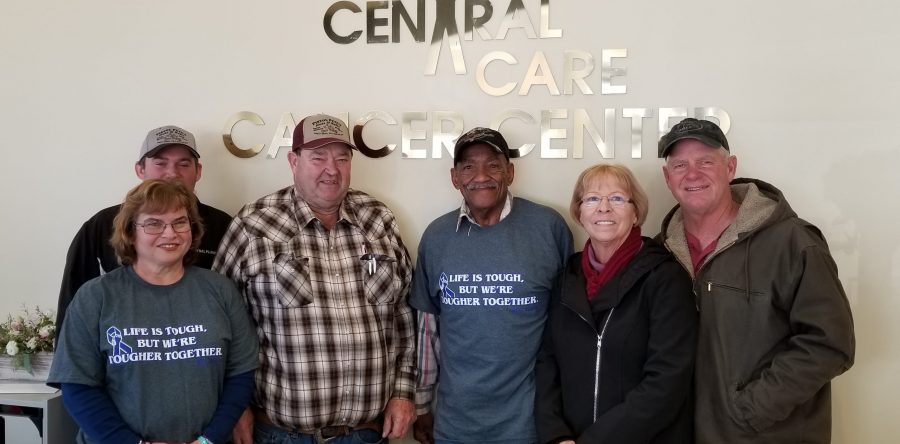Pete Krier really knows how to throw a party. The Claflin, Kansas native just turned 65 and beat what’s considered Stage III colon cancer. So Pete hosted an “I beat cancer” party, and roughly 500 friends, neighbors, family and community members gathered to celebrate Pete’s victory, his birthday, but also were educated on the importance of getting screened for colon cancer.
It was September of 2018 when Pete found himself at Clara Barton Hospital in Hoisington. He had been fighting an infection in his legs and was anemic. Dr. P.J. Stiles ordered a colonoscopy. That’s where five to six tumors were found inside his colon. Pete then went on to have surgery in October to remove a big section of his colon, where Pete proudly says, “I got a picture of it if you want to see it.”
But the good-natured owner of Pistol Pete’s Nuts and Bolts in Great Bend wasn’t done yet. Due to cancer found in his lymph nodes as well, Pete was referred to see Dr. Mark Fesen, Medical Oncologist at Central Care Cancer Center. In January of 2019, Pete began chemotherapy treatments that occurred every other weekend for six months.
As far as side effects go, Pete says, “You wouldn't believe it but I got hyper when I was on chemo. I couldn't sit down. It was crazy. I couldn't sit still, couldn't shut up, nothing. I got a lot done, really.” Except housework, Pete’s wife Lois adds jokingly.
Pete’s journey in beating colon cancer also came with its share of complications. There was a catheter issue, being unable to urinate properly and wearing a colostomy bag for just over a year. But through it all, Pete says “you can’t just give up”.
According to the American Cancer Society, colorectal cancer cells sometimes make substances called tumor markers that can be found in the blood. The most common tumor marker for colorectal cancer are carcinoembryonic antigen (CEA). Blood tests for these tumor markers can sometimes suggest someone might have colorectal cancer, but they can’t be used alone to screen for or diagnose cancer. This is because tumor marker levels can sometimes be normal in someone who has cancer and can be abnormal for reasons other than cancer. Tumor markers are used most often along with other tests to monitor patients who already have been diagnosed with colorectal cancer. They may help show how well treatment is working or provide an early warning that a cancer has returned. Levels of CEA higher than 20 ng/ml are considered very high. Pete was up to 35 ng/ml before his surgery and now is at a 2 ng/ml, which is normal.
Being close to home for Pete’s chemo treatments was also key to his success. Evidence has proven that going through cancer treatments near loved ones and close to home have improved outcomes. Central Care Cancer Center is dedicated to keeping cancer care close to home. They have facilities throughout Kansas, mostly in rural settings, including Great Bend. Central Care Cancer Center is dedicated to making the patient their top priority by offering comprehensive cancer care including chemotherapy, radiation therapy, financial counseling and other supportive services all under one roof.
For Pete’s “I beat cancer” party, he thought it would be kind of selfish to just have a birthday party. “What I wanted was a thank you party for everybody's prayers. How do you pay someone back for their prayers? We had everyone and their dog praying for us and helping us out. And I thought while we're throwing a party, why don't we go an extra yard and see if we can prevent someone from having to go what we went through, and a lot of other people are going through.”
They got the word out about the party, but Pete and his wife Lois did not expect the nearly 500 people that turned out, including Dr. Stiles and Dr. Fesen, who spoke at the event.
“We were just trying to help some of our family and friends, and prevent them from having cancer. This was a good reason to get together instead of at a funeral service,” said Pete. Unfortunately Pete and his wife Lois have lost many relatives and friends to a variety of cancers.
Pete’s friend Karen added, “(The party) was an educational moment that opened a lot of eyes. We are all here for each other and we need to be here to support each other. The party got a lot of people thinking and talking. I was just moved by everybody who got up and spoke.”
March is National Colorectal Cancer Awareness month. According to the American Cancer Society, overall the lifetime risk of developing colorectal cancer is about 1 in 23 for men and 1 in 25 for women. And on average, there’s a 1 in 3 chance that a person develops a form of invasive cancer. Pete adds, “if there was 500 people at the party, say 175 people may have cancer now and don’t know it, and if we could save those 175 by encouraging screening, what would that mean? (chuckling) I’d get a door in heaven!” Amen Pete. Amen.



2 Responses